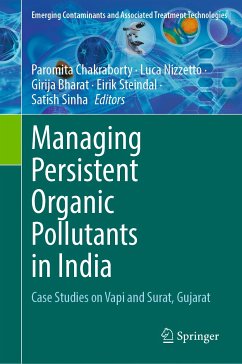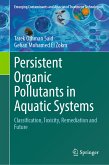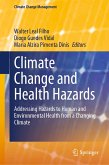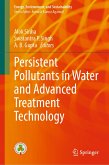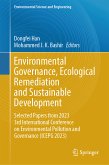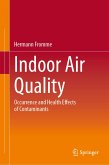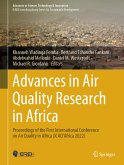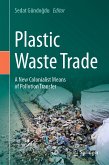Professor Paromita Chakraborty is the Head for Centre for Research in Environment, Sustainability Advocacy and Climate Change in SRM Institute of Science and Technology, Kattankulathur, Tamil Nadu. Professor Chakraborty has over a decade experience on the multimedia transport of legacy and new persistent organic pollutants, bioavailability of organic contaminants, environmental chemistry, transformation and remediation of endocrine disrupting compounds, mismanagement of plastic and electronic waste, and conversion of waste into wealth. Professor Chakraborty is the principal investigator for projects funded by national funding agencies like DST, MoEFCC and international funding agencies like Research Council of Norway, Norwegian Embassy and Swiss Development Cooperation. She has published more than 100 peer reviewed journal articles and book chapters. Her research has been used as the basis for the creation of several policy briefs that were important for decision makers.She is the recipient of prestigious Water Advanced Research and Innovation (WARI) Fellowship 2016, awarded by the Indo-US Science and Technology Forum. Among numerous awards that Prof. Chakraborty received, Early career chemist 2015 by the American Chemical Society and Hiyoshi Environmental Award 2020 are the most prestigious ones. Dr. Chakraborty is the special mentor for the Association of Common Wealth Universities Blue Charter Fellowship. She is an associate editor in the Science of the Total Environment and Arabian Journal of Geosciences. Dr Luca Nizzetto is a research scientist, research manager and knowledge broker with a background in ecology, biodiversity management and pollution research. He recently expanded his research activity in the areas of socio-ecosystems, knowledge management and knowledge brokering for societal change. He conceives and runs independent research programs in the areas of anthropogenic pressures and impacts on socio/ecological systems with current activities on plastic waste value network modelling and management for sustainability (with a focus on developing countries), environmental sustainability of food production systems, food safety, chemical and plastic pollution fate, behaviour and impacts, environmental and human exposure to contaminants, knowledge management and knowledge brokering for impact generation. He coordinates large consortia in international projects including projects funded by the EU Horizon framework. He is the co-founder of the International Knowledge Hub Against Plastic Pollution (IKHAPP.org). He is the Lead scientist at the Norwegian Institute of water research (Tenure track for Chief Scientist), and currently coordinates two distinct research teams and two international academic/research networks. In his current position, he formally and successfully acts as mentor for junior scientists and actively contributed to a seminar program dedicated to early-career scientists. He has successfully supervised students of bachelor, master and PhD level, as well as several Post Doc and early career scientists. He is the main author of some highly-cited research articles, and his works receive over 1000 citations each year. Dr Girija K Bharat is the Founder Director of Mu Gamma Consultants (Gurgaon, India). She is an alumnus of IIT (ISM), BITS (Pilani), George Mason University, USA. She has over three decades of experience in the water and wastewater sector, Persistent Organic Pollutants, Endocrine Disrupting Chemicals, environmental chemistry, plastic waste management. She is the principal investigator for several national and international projects funded by USAID, UNICEF, GIZ, Swiss Development Agency, Norwegian Development agency, Research Council of Norway, Norwegian Embassy, Ministry of Jal Shakti (Government of India), UNIDO, NIUA, ICLEI-South Asia. She has published over 110 peer reviewed journal articles, book chapters, Policy Briefs, Discussion papers. She has authored the chapters in the Global Sustainable Development Reports (GSDR) 2015 (Oxford University Press, 2016). She was the lead author of the 'State of Urban Water and Sanitation in India report-2017', and authored the science informed policy briefs that are of national and international significance for policy makers. Based on her achievements in research, capacity building and policy advocacy, she has received several prestigious awards including the 'Women Transforming India' Award by NITI Aayog, Government of India, Global Environment Award, Aqua Excellence Award, Save the Environment Award and several others. She is a technical expert of several national and international scientific and policy groups including the Bureau of Indian Standards (BIS), NITI Aayog, Research Council member of CSIR-NEERI, Ministry of Jal shakti. She is a member of the American Chemical Society and Iota-Sigma-Pi-an honor society for women in Chemistry in the US. Eirik Hovland Steindal is a research scientist with twenty-years working experience on environment and development issues, nationally and internationally. As a former bureaucrat, he has extensive experience with policy development, regulatory work and design and operation of multilateral environmental agreements. For seven years, he worked as a negotiator for the Norwegian government contributing to the establishment of the Minamata Convention on mercury. As a government official and academic, He has led multiple large research projects and collaborations with China and India. A core focus has been to support the two countries with ratification and implementation of the Minamata and the Stockholm Convention, as well as developing domestic policies to tackle plastic pollution. All projects have involved working closely with government, NGO's and business associations to find socioeconomic sustainable solutions and control measures. He is currently finalizing a PhD on international regulation and management of chemicals and plastic waste at the Norwegian University of Life Sciences. He has also international working experience from UN Environment, environmental NGOs, consultancies, and academic research. Satish Sinha is the Associate Director of Toxics Link (The Just Environment Charitable Trust), a non-profit Environmental organization working in field of Toxics and Waste. He has been actively involved with this research-based policy advocacy group since 2003 and has been leading a team to bring change both at policy and grassroots level. He has over 17 years of experience and sound professional expertise on issues related to chemicals, waste management and related public policies. Provide strategic leadership in spearheading key environmental campaigns in the country. He has worked closely with various state governments and the central government on some key environmental issues. He possesses excellent analytical and managerial skills. He sspecializes in international and national policy advocacy on issues such as waste/ chemical management and has over 14 years of experience on project planning and execution on waste management issues both in India and outside. Mr Sinha is experienced with environmental policy instruments like EPR, precautionary principles, international conventions, UNEP processes especially on chemicals and waste related issues. He has several publications to his credit.
Chapter 1 - Status of POPs Pollution in India.- Chapter 2 - Regulatory framework, Policies and Programs in POPs Management in India.- Chapter 3 - POPs Associated with Plastic Waste.- Chapter 4 - Transport of POPs from Source to Sea.- Chapter 5 - Environmental Monitoring Techniques of Targeted POPs.- Chapter 6 - Environmental and health impact.- Chapter 7 - International Regulatory Frameworks and Best Practices in Management of POPs.- Chapter 8 - Overview of Use and Release Sources of the Seven New POPs.- Chapter 9 - Analysis of Gaps in Management of POPs in India.- Chapter 10 - Case Studies-Tapi and Daman Ganga River Basins in Gujarat.

